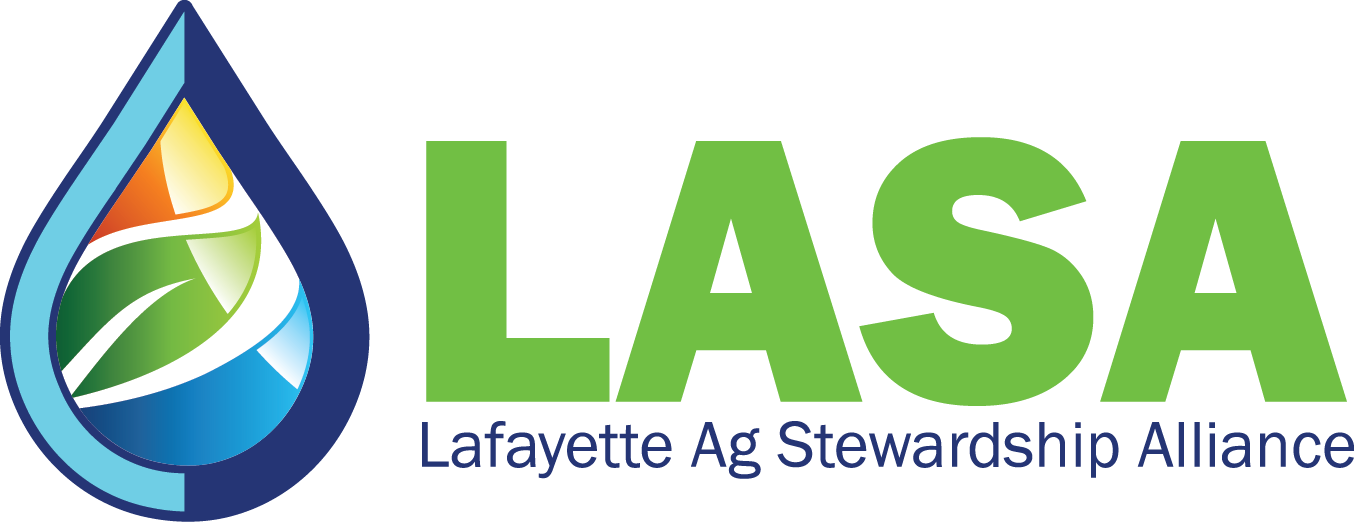Article by Lauren Brey, Farmers for Sustainable Food and Dana Christel, DATCP Conservation Specialist
Farmers for Sustainable Food (FSF) is a collaborative, industry-supported effort to promote and support farmer-led solutions to today’s environmental challenges. The group supports farmer-led groups including Calumet County Agriculture Stewardship Alliance, Lafayette Ag Stewardship Alliance, Sheboygan River Progressive Farmers, Peninsula Pride Farms, Western Wisconsin Conservation Council and Yahara Pride Farms in a multitude of ways depending on each groups’ unique goals and needs.
An exciting project developed and coordinated by FSF in partnership with Lafayette Ag Stewardship Alliance (LASA), Grande Cheese and other key stakeholders is focused on fostering dairy supply chain transparency through analysis of on-farm conservation and soil health practices. This work aims to create a replicable framework for farmer-led sustainability projects that incorporate both environmental and financial aspects of sustainability.
LASA and project stakeholders are exploring the impacts of conservation practices used by LASA members through this project. Results will help communicate the sustainability of farming practices to other farmers, customers, the local community, the agricultural supply chain and regulatory agencies.
Benchmarking and tracking sustainability in farmer-led projects
The project is designed around three phases. Phase one, currently underway, is the development of a framework document for establishing and conducting local farmer and industry-led sustainability projects. The framework consists of assessments of on-farm sustainability metrics to help farmers determine what is most useful for their operation and explains how to document the impact of on-farm conservation practices through use of available sustainability assessment tools and financial analysis. This framework will be available at no cost to farmers and others interested in creating similar projects, with an expected release date in late 2020 or early 2021.
Exploration of evaluation tools and methods
Phase two implements the framework in a pilot project. This phase includes environmental and financial analyses of participating farms and has several components. The environmental analysis portion includes on-farm metrics through Field to Market’s Fieldprint Platform and a local water resources assessment using the Prioritize, Target, Measure Application (PTMApp). All 12 participating farms are completing this portion of the analysis. Field to Market’s Fieldprint Platform (FPP) is a web-based software program designed to measure current conservation performance using sustainability metric scoring. The FPP is currently being used in over 50 Fieldprinting projects throughout the U.S., and is currently viewed as an industry-standard in agricultural supply chain sustainability projects.
Many farmers in Wisconsin currently utilize SnapPlus, Wisconsin’s nutrient management planning software, providing Wisconsin farmers with a tool for protecting soil and water quality. Through this project, stakeholders are also exploring the opportunity to integrate SnapPlus into the FPP to reduce redundancy with data entry between the platforms and to determine areas of commonality for a future project for possible integration. This could promote increased adoption of these tools among farmers and their partners for understanding the impact of conservation practices.
The financial analysis of three dairy farms will be done by Farm Business Management experts at Southwest Wisconsin Technical College. Using software called FINPACK from the University of Minnesota Center for Farm Financial Management, Farm Business Management experts at Southwest Wisconsin Technical College will be working with farmers to evaluate aspects of financial sustainability. FINPACK is an analysis software built for agriculture farm communities that assists in building annual balance sheets, annual financial analysis, and cash flow projections. This software allows for an in-depth whole-farm analysis as well as individual crop and livestock enterprises. In addition, farms receive a first look at their 21 farm financial ratios established by the Farm Financial Standards Council. This will aid in this project by providing annual financial benchmarks for each participating farm as well as a comparative to similar farms in FINBIN, a national database that provides farm financial and production benchmark information.
Additionally, this project will include a FARM Environmental Stewardship (ES) evaluation for the three dairy farms that are also participating in the financial analysis
Looking beyond the farm through the supply chain
The information generated during the project implementation will help supply chain partners better understand the positive and impact they can have with on-farm sustainability by supporting farmer-driven efforts, as well as the pressing need for their involvement in further driving and scaling farm sustainability and conservation solutions.
Desired Project Outcomes:
– Create a positive and meaningful experience for farmer participants with regards to engaging public and private entities in conservation.
– Assess if current farming practices in conservation-conscious areas are having a positive impact on sustainability and water quality.
– Demonstrate the financial benefits of conservation practices on farms.
– Increase the use of sustainability measurement platforms by farmers to inform land and water management decisions leading to increased adoption of conservation measures.
– Provide public and private support and assistance to farmers pursuing conservation on their land.
– Increase the effectiveness of local, state and federal conservation programs by demonstrating tools that can assist in prioritizing, targeting and measuring the performance of conservation practices.
– Increase engagement and landowner involvement in conservation groups and studies.
This pilot project is anticipated to run through 2022. Having three years of data will help the participants and partners have a better picture of the impact of LASA member’s sustainability efforts as well as to share findings with other industry partners and farmer-led groups for adoption.
This project has the potential to positively impact sustainability practices not only in Wisconsin but beyond. Other key stakeholders include The Nature Conservancy, Wisconsin Department of Agriculture, Trade and Consumer Protection, Lafayette Land Conservation Department, Ross Soil Service, Southwest Wisconsin Technical College, GPS Dairy Consulting, UW-Madison SnapPlus and Dairy Farmers of Wisconsin. Houston Engineering Inc. (HEI) has been engaged as the consulting firm for the project.
